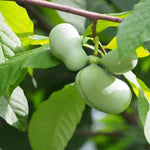Subscribe and save 10%!

Asimina / Paw Paw (Asimina triloba)
56 SEK
Unit price perOut of stock
Share
SEEDS (5pcs/bag)
Common names: Asimina, Paw Paw
Scientific name: Asimina triloba
Family: Annonaceae
Plant history & use:
Asimina is one of the most tropical-like fruits that can grow in temperate climate - USDA Zone is 5-8. The taste is best described as a mixture of banana and mango with a tint of strawberry and the texture is similar to that of papaya or a perfectly ripe avocado. The fruit looks like a small green mango with golden yellow flesh.
The fruits are usually eaten as they are but can also be used to enrich refreshing drinks, pastries and cocktails with their mild tropical taste. The fruits are rich in vitamins such as riboflavins and B-6. You can also use the fruits to make ice cream.
Cultivation:
Asimina originates from and grows naturally in North America, often as undergrowth under larger trees.
They thrive in humus-rich, nutrient-rich and slightly moist well-drained soils.
Asimina trees thrives in sheltered locations and therefore likes to grow under larger trees and also like to stand close together with other Asimina trees, approx. 1 m apart in full grown size. This protects against wind and direct sunlight and facilitates pollination. East facing spots is a suitable place to plant Asimina. Plants that grow in exposed locations do significantly worse than plants that grow in protected locations.
Water abundantly or plant in a place with good water supply.
The Asimina plant puts a lot of energy into developing a strong root system in the beginning - the root can often be thicker than the trunk in the first months. When growing in pots, a tip is to plant in deep pots directly, this gives the opportunity for more efficient root development and you avoid disturbing the plant before it has grown.
In open grounds, Asimina naturally grows into a dense thicket by spreading via root shoots.
It takes about 4-8 years from seed sowing to fruiting tree.
Sowing:
NOTE: These seeds have already been treated with a cold period (stratification). The stratification below is therefore not necessary if the seeds are sown soon after purchase.
The seeds need a cold period of 2-3 months to germinate. This can be done by placing the seeds in a bag of sand/peat in the fridge for the suggested time. After the cold period, the seeds are sown in soil, keep the seed warm and moist, preferably around 25 degrees.
Characteristics:
Lifespan: Perennial
Location: Partial hhade
Height: 1-10 m
Germination Time: 1-12 months
USDA Zone: 5-8
- Choosing a selection results in a full page refresh.
- Opens in a new window.








